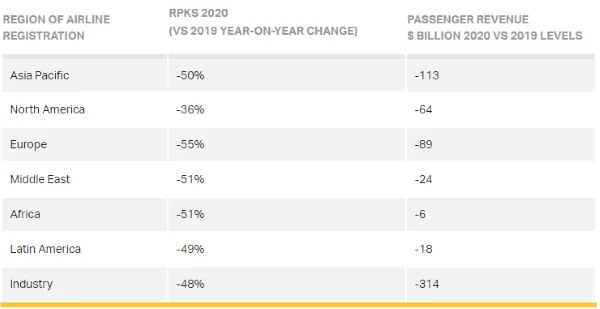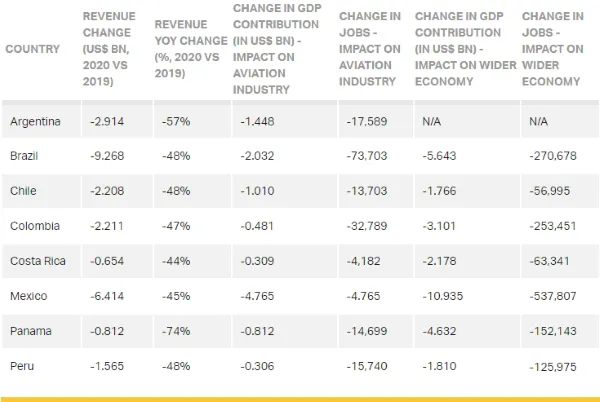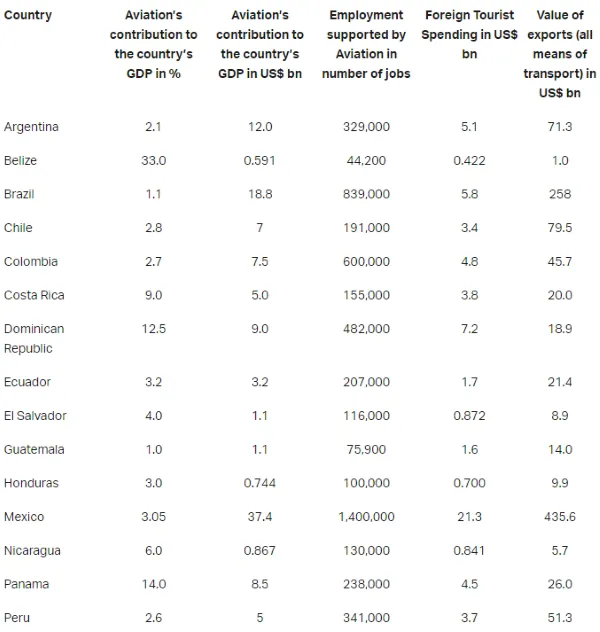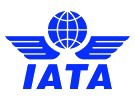The International Air Transport Association (IATA) is reminding governments across Latin America and the Caribbean to consider urgent relief measures for airlines, as they continue to confront the COVID-19 crisis.
“The necessary response to contain this public health emergency has in turn created an economic crisis. While we fully understand the need for the measures instigated to fight the virus, governments need to mitigate the effects. A failure of the airline sector risks connectivity, prolongs the pain for employees across the travel value chain and hampers the socio-economic recovery,” said Peter Cerdá, IATA’s Regional Vice President for the Americas.
IATA released an updated analysis showing that the COVID-19 crisis will see airline passenger revenues drop by US$314 billion in 2020, a 55% decline compared to 2019. On 24 March IATA had estimated US$252 billion in lost revenues (-44% vs. 2019), based on a scenario with severe travel restrictions lasting three months.
The updated figures reflect a significant deepening of the crisis since then, and are based on the following parameters:
- Severe domestic restrictions lasting three months
- Some restrictions on international travel extending beyond the initial three months
- Worldwide severe impact, including Africa and Latin America (which had a small presence of the disease and were expected to be less impacted in the March analysis).
Full-year passenger demand (domestic and international) is expected to be down 48% compared to 2019.

For airlines based in Latin America and the Caribbean this translates into a drop in passenger revenues of US$18 billion for 2020 (the 24 March estimate was US$15 billion).
Breaking the latest estimate down by country shows the following effects on passenger revenues per market (all passenger traffic to, from and within a market) and corresponding direct and indirect job losses per country:

With this scenario in mind, IATA is asking governments to consider:
- Direct financial support to passenger and cargo carriers to compensate for reduced revenues and liquidity attributable to travel restrictions imposed as a result of COVID-19.
- Loans, loan guarantees and support for the corporate bond market by the Government or Central Banks: The corporate bond market is a vital source of finance, but the eligibility of corporate bonds for central bank support needs to be extended and guaranteed by governments to provide access for a wider range of companies.
- Tax relief:Rebates on payroll taxes paid to date in 2020 and/or an extension of payment terms for the rest of 2020, along with a temporary waiver of ticket taxes and other government-imposed levies.
“The impact on airlines in the region for this crisis continues to be brutal. Passenger traffic has ground to a halt and revenue streams have dried up. No amount of cost cutting will save airlines from a liquidity crisis that is imminent and severe. This will have detrimental effects on countries’ economies and jobs. Governments must act fast,” said Cerdá.
IATA is also renewing its call for the coordinated approach among governments to keep air cargo flowing. Delays in permit approvals, quarantine measures for air cargo crew and not enough support on the ground continue to hamper the movement of cargo flights carrying vital medical supplies and other necessities.
“The suspension of passenger flights has led to the loss in available cargo capacity. This is especially critical across Latin America and the Caribbean where, in many cases, no alternative means of transport exists. Airlines are providing as much capacity as they can, but governments need to step up and ensure that vital supply lines remain open and efficient, and that there is adequate infrastructure and support available in the air and on the ground,” said Cerdá.
There are still too many examples of delays in getting charter permits issued, a lack of exemptions on COVID-19 testing for air cargo crew, and inadequate ground infrastructure to/from and within airport environments. Air cargo needs to move efficiently throughout the entire supply chain to be effective. We urge governments to:
- Cut the paperwork for charter operations
- Exempt cargo crew from quarantine rules that apply to the general population
- Ensure adequate staffing and facilities to process cargo efficiently
- Mutually recognize agreed global standards (health certificates, licenses, etc.)
- Ensure alternate airports are available even if passenger flights are not operating
Furthermore, IATA reminded governments of the need to cooperate with the industry in the organization of repatriation flights. As borders were closed and flights suspended, many people were stranded outside their home country or country of residence. Airlines have performed more than 2,500 repatriation flights to and from the region helping some 400,000 stranded citizens. While the requests for such flights have fallen, there is still the occasional need for these.
“As an industry we can take pride in the way airlines responded to governments’ requests to repatriate citizens. Many of these flights have been a logistical challenge and we have seen airlines serve destinations in Latin America and the Caribbean which they had never flown to before. Collaboration across the entire travel value chain was essential and we hope that we can count on governments in the region to support such flights as and when needed,” said Cerdá.
Aviation across Latin America and the Caribbean:
- supports a total 7.2 million jobs,
- annually handles 4.1 million tonnes of air cargo,
- provides connectivity to 385 cities across the region,
- links the region to 160 cities in other parts of the world, and
- contributes US$167 billion to the region's GDP.

Source: IATA / Oxford Economics / Full country reports can be viewed and downloaded here.
The presentation can be downloaded from the following link.
The recording of the regional press briefing can be downloaded here.
For more information: IATA
IATA
www.iata.org
